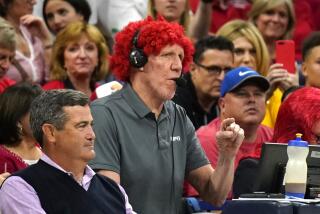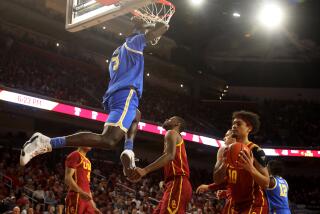Auerbach’s Contributions Went Beyond Just Winning
- Share via
They’re playing at the fancy new FleetCenter so there’s no reason for the Knicks to hate playing in Boston Friday night. That old parquet floor will soon be gone, along with the infernal heat at playoff time and the two showerheads in the visitors locker room that often gave nothing but cold water.
And the smoke from Red Auerbach’s cigar is only in the front office and the stuff of legend in the sanitized world.
Mostly it’s a better place for the Knicks and all the other visitors because the Celtics don’t win all the time now. You wouldn’t have expected applause from the Knicks of old when the banner with Auerbach’s cigar-smoking silhouette was raised on opening night.
Fuzzy Levane, the venerable Knicks scout, doesn’t like Auerbach and neither did Red Holzman and they went back the half-century to the primitive years of pro basketball with him. “He’s not a likable guy,” Levane said.
Bob Cousy, who calls the man by his given name as only Auerbach’s wife Dorothy does, said, “Arrogance is confidence; when you beat everybody as much as Arnold did, you don’t particularly endear yourself; the other stuff is bull.” Just this week, Cousy was campaigning for Bill Bradley in New Hampshire and a listener told him just how much he remembered hating Auerbach and the Celtics.
And that cigar.
Auerbach won nine championships as coach of the Celtics and seven more as head of the braintrust and built “Celtic Pride,” which is matched only by the Yankees. “But how did he do it?” said K.C. Jones, who was part of almost all of them and remembers being underpaid.
Auerbach is 82 and largely is a ceremonial figure, as Rick Pitino would have it in his reign. Recognizing a man’s contributions should not be limited to obituaries. Merely winning is an accomplishment; Auerbach made contributions, which should not be lost in the cigar smoke. “I think he’s actually underplayed,” Cousy said.
“He could have found more money for me,” Satch Sanders said.
Auerbach was the first to draft a black player, Chuck Cooper, in 1950. He made Bill Russell the first black coach in any sport in 1967. And in between, in 1964, he was the first to start five black players. Willie Naulls celebrates that lineup with an oil painting of Russell, Sam Jones, K.C. Jones, Sanders and himself in his living room in California.
Auerbach wasn’t some great integrationist. He was a basketball coach, which was his higher calling. “It just so happened that Red had, let’s say, good competitive instincts and he played and utilized people who could get the job done,” said Sanders, who now is in the league office.
“What he had was respect and equal treatment for all,” Sanders said. “I’m certain he had to override objections; that was not being done at that time in any sport.”
Those things were done 35 and 50 years ago, and not as public-relations gestures. If Auerbach consulted with the owner about the effect on ticket sales, it is not known. “I doubt it,” Cousy said. “Arnold was his own person.”
Sanders and K.C. tell of the exhibition game scheduled in Lexington, Ky., to honor former Kentuckian Frank Ramsey, when “colored” players were told to identify themselves as Celtics to be served in the hotel dining room. Russell was stopped at the door and declined the identification. He intercepted teammates and summoned Auerbach.
Red said he thought it would be beneficial if they stayed and the issue got media attention. Russell said it would be better if they left. Auerbach said he’d take them to the airport. “Yes,” Sanders said, “I like Red very much.”
He kept the Celtics on top when they had the lowest draft by finding John Havlicek. After Russell he rebuilt the dynasty with Dave Cowens, who was said to be too short for center and again by drafting Larry Bird in advance and waiting through his year of college eligibility. He traded for Dennis Johnson, Kevin McHale and Robert Parish. He got mileage from players thought too old by other teams. He believed in keeping the nucleus intact, which fostered that real Celtic Pride.
How Auerbach came to get Russell is another legend. Cousy recalls Auerbach telling him a year in advance of this player who was going to change everything. Rochester had first draft and didn’t think it could compete with the Globetrotters for Russell. Levane, then working for Rochester, offered the pick to the Knicks for Walter Dukes and $15,000. Ned Irish said $15,000 was too much. So St. Louis took Russell with the second pick and, reluctant to try a black star in that city, traded him to Auerbach.
What if the Knicks had him all those years?
The Celtics did and Auerbach had his cigars. “When he lighted them on the road it would ... everybody,” Cousy said. Paul Seymour, who played and coached against Auerbach, wrote that his goal in life was not to win a championship but to have Auerbach light up prematurely so he could squash the cigar in his face.
“In all those years I never saw him get burned,” Cousy said. “Arnold loved it; it was the precursor of trashtalk.”
In this time when coaches hold up fingers to call a play, Auerbach’s Celtics played the game on the floor. He took their input. “Russ got the rebound, got it to me and we told the rest of the guys to get their butts down court,” Cousy said. “If we never had to call one of those six plays, it meant we blew the doors off somebody.
“The Celtics have seven guys to do now what Red did. He didn’t have time to turn up the heat. On the break, was I thinking about the dead spots on the floor? Thinking that was why we won was the beginning of the copout society.”
Auerbach’s homecourt advantage was talent. “I’ll always like him,” Sanders said. “And he should have found more money for me.”
More to Read
Go beyond the scoreboard
Get the latest on L.A.'s teams in the daily Sports Report newsletter.
You may occasionally receive promotional content from the Los Angeles Times.










